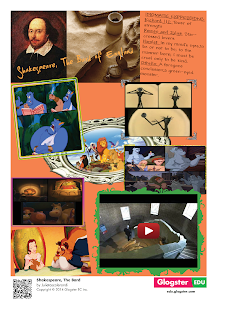Sunday, 25 May 2014
Sunday, 18 May 2014
Tuesday, 13 May 2014
Shakespeare round-up
Watch this panel discussion held earlier this year in Germany, organised by the British Council.
What ideas do you find most striking? Why? Do they make you reconsider the conclusions in your digital posters?
Make a very brief comment in the Padlet below (please indicate your name). Just double click and start writing. It's probably better to click on the link and open the poster in a new tab.
Finally, think back on the digital posters and presentations and the activity above. Would you say this has been a meaningful learning experience? What would you change to improve it?
Post a comment in this Padlet. It's probably better to click on the link and open the poster in a new tab.
Monday, 12 May 2014
Shakespeare, our contemporary?
Here is our glog! What we wanted to illustrate, as many of us, was the fact that Shakespeare is still our contemporary. One of the many reasons for this is the fact that his themes are timeless. No matter our age or where we are, we all feel attracted to topics such as thwarted or impossible love, fear of death, betrayal, jelousy, ambition, revenge. The relevance of these themes, and therefore of Shakespeare, has been reflected on the many films based both on Shakespeare's storylines and on these topics in particular. This glog presents some of the previously mentioned films as a proof of how appealing Shakespeare is. Hope you enjoy it!
Sunday, 11 May 2014
Shakespeare, our contemporary?
Through our glog we aimed to represent visually how Shakespeare is present in our everyday lives. The English language owes a lot to him as tons of words were put into use because of their appearance in his plays - some of them being borrowings and others his own creation. We use the English language on a daily basis without realising that much of what we are saying is due to his brilliance. Even some proverbs and entire phrases or part of his soliloquys are employed as part of our everyday speech. Besides, there are plenty of songs based on his masterpieces; and appart from that, a large number of films have been made out of his plays or taking some aspects of them. Shakespeare is also present worldwide in places such as Stratford-upon-Avon, where his own house as well as his wife's cottage are open to the public as tourist attractions, and Verona where you can find Juliet's balcony and where couples from all over the world go to make their vows and promise eternal love as Romeo and Juliet do in the play.
What makes Shakespeare our contemporary is the universality of the themes and values he depicts in his plays: love in all its forms, lust, appearance and reality, ambition, loyalty, order and disorder, identity, death and illness, good and evil, among others. It is impossible not to feel identified with some of his characters; and this is where his genius lies: he gave his characters and plays in general a universal appeal.
ROMINA, AILÍN AND MELISA.
Saturday, 10 May 2014
Shakespeare, the Bard of England!
SHAKESPEARE, THE BARD OF ENGLAND!
As most of us in our class, we wanted to show that as Ben Jonson (1572-1637) once said `Shakespeare was not of an age but for all time’. We concentrated on whether we should deal or not with Shakespeare’s works in the classroom. We found two main reasons. On the one hand, we believe that Shakespeare is still popular and famous since his stories are universally constant what means that they appeal to us despite the many years that separate us from him. With our glogster, we proved that Shakespeare is still present everywhere both in our daily lives and in fiction, as Disney’s movies depict. On the other hand,Shakespeare has created a lot of the English we use today. Even though, sometimes even we are not aware of that he has contributed a lot of new words and phrases to the English language.Finally, as a conclusion we chose to add a video which explains in a more academic language why and how we should work with Shakespeare’s works. We hope you enjoy it! Florencia and Julieta.
Friday, 9 May 2014
IS SHAKESPEARE MODERN? (by Angela Panebianco and Guillermina Lancioni)
IS SHAKESPEARE MODERN? (click on title to access)
Nearly 400 years have passed since Shakespeare's death, and he is still present in our lives, for instance, in marketing and advertising, in the film industry, in language and in the most significant of all, THE ARTS. For this reason, we designed this Glogster to honour his significant influence on modern life and his enormous contribution to society of all times.
We hope you enjoy it!
Subscribe to:
Posts (Atom)





